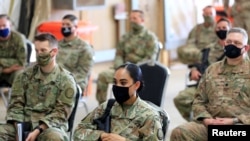Middle East experts and analysts are questioning whether ending the U.S. combat role in Iraq, announced earlier this week, will negatively affect America’s counterterrorism operations against remnants of the Islamic State extremist group in neighboring Syria.
U.S. officials have not announced any change to their mission in northeast Syria, where about 900 troops are providing support to the Syrian Democratic Forces, a Kurdish-led military alliance which has been a major partner in the fight against IS.
But, “It is hard to separate the U.S. military mission in Syria from the one in Iraq,” said Sadradeen Kinno, a Syrian researcher who closely follows military developments in the country.
“Unlike Iraq, U.S. military presence in Syria hasn’t been at the invitation of the Syrian government,” he told VOA. “This fact makes Iraq such an important place for the U.S. in order to successfully carry on its mission in Syria.
“The SDF is a non-state actor and therefore the U.S. has to rely on an allied government in Iraq to make sure its operation in Syria remains solid in terms of logistics and other matters related to supply transportation.”
U.S. President Joe Biden announced on Monday that American forces will end their combat responsibilities in Iraq by the end of this year.
Instead, the troops will “continue to train, to assist, to help and to deal with IS as it arises,” Biden said following a White House meeting Iraqi Prime Minister Mustafa al-Kadhimi.
About 2,500 U.S. troops are currently in Iraq. Biden did not say how many of those will remain in 2022.
The U.S. military does not link its Iraq and Syria operations. The Pentagon considers its involvement in Syria as part of the broader global effort to counter IS.
Nicholas Heras, a senior analyst at the Newlines Institute for Strategy and Policy in Washington, says the U.S. military effort in Syria is particularly dependent on a continuing presence in the Kurdistan Region of Iraq.
The United States has a major military base in Erbil, the capital of Kurdistan Region, which according to Heras, has become one of the most important staging areas and listening posts for the U.S. government in the Middle East.
“The ground lines of communication and reinforcement from Iraqi Kurdistan into northeast Syria is what matters most to continuing the U.S. operations in support of the Syrian Democratic Forces,” Heras told VOA, adding that, “there are no indications that the U.S. will withdraw from its base in Erbil.”
Asked by VOA whether the Iraqi government would continue to allow the U.S. to use Iraqi bases in support of its anti-IS operations in Syria, Iraqi Foreign Minister Fuad Hussein said, “U.S. military forces in Syria have a unique status and Iraq is not involved in that.”
“However, we always discuss with the Americans the presence of IS in Syria, because clearly its presence there poses a threat to Iraq too,” Hussein said Monday during a press conference in Washington following the meeting between Biden and al-Kadhimi.
Kirmanj Gundi, an author and professor at Tennessee State University who writes on regional Kurdish politics, believes that besides impacting the war on IS, any change of status for the U.S. troop presence in eastern Syria could have political ramifications for U.S. interests in the country.
If the decision to end the U.S. combat mission in Iraq ultimately alters the current U.S. presence in Syria, “it would certainly embolden Iran and its allies in Syria, and also put U.S. partners in danger,” Gundi told VOA.
In recent months, U.S. bases in Syria have come under several attacks for which Washington blames Iran-backed militias. U.S. bases in Iraq, including the one in Erbil, have also been targeted by missiles fired by Iranian-backed groups.
VOA Kurdish service’s Herow Zangana and Salih Damiger contributed to this story from Washington.




